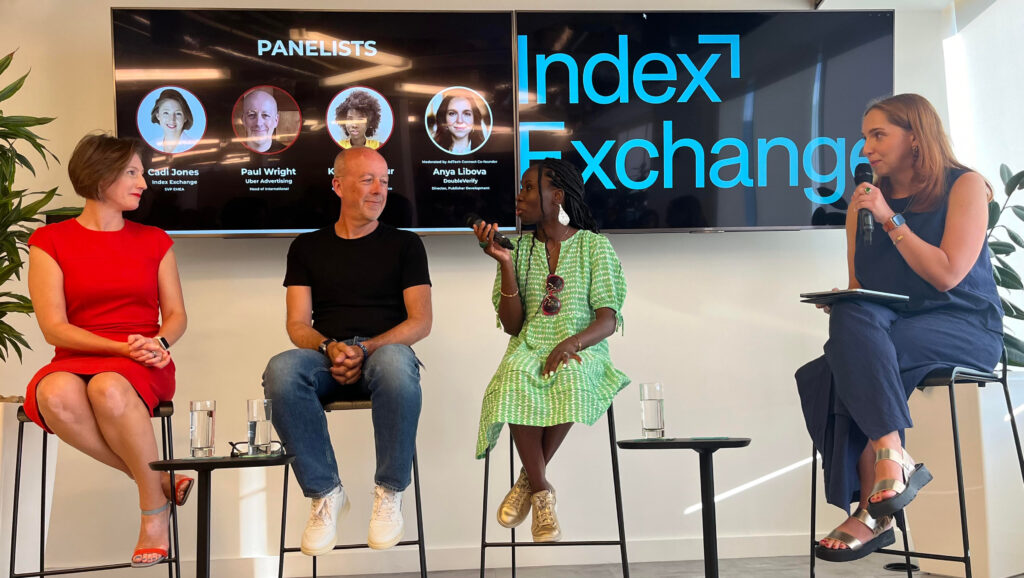Building Bridges at AdTech Connect
by on 6th Aug 2024 in News

Panellists at the launch of AdTech Connect, an initiative for those starting out in ad tech sponsored by Index Exchange and ExchangeWire, reveal their secrets to building out a solid industry network, being a good mentee/mentor, and keeping up with the fast pace of the ever-evolving industry.
Founded by Rishan Chopra, Jack Tunney, Sean Halpin, and Anya Libova, AdTech Connect sets out to foster growth and innovation by creating opportunities for the next generation of ad tech professionals through well-curated networking events and workshops. The inclusive and accessible community aims to be a space for connection, learning and collaboration.
Panel
Host: Anya Libova, Director, Publisher Development, DoubleVerify
Cadi Jones, SVP EMEA, Index Exchange
Paul Wright, Head of International, Uber Advertising
Kiessé Lamour, Global Head of Media, Commerce, VML
Building an industry network
We all hear about the importance of building a professional network, but to those newer to the industry it can be a challenge knowing where to start. As we all know, having a strong industry network can open the door to a myriad of new career opportunities, as well as aiding personal development and even making your job more fun. So, where to start?
Showing up is the first step. “The more you force yourself to show up, the easier it will be,” said Cadi Jones, SVP EMEA at Index Exchange. Jones suggested setting a specific goal for yourself before attending a networking event, even something as small as talking to two people. Two people isn’t many – but if you follow-up and keep in contact with them, those two people could become a valuable part of your network. Jones also suggested always having a question to ask prepared beforehand – doing so should minimise the risk of awkward encounters, which can seem all too likely to those just beginning their careers, or those who find it intimidating to strike up a conversation with a stranger.
Kiessé Lamour, Global Head of Media, Commerce at VML expanded on this idea. Although the ad tech industry is full of outgoing people who thrive in social environments, the industry is also full of people who struggle with social interaction. Those who have social anxiety, are neurodivergent, disabled or simply introverted are likely to face more obstacles when it comes to networking at in-person events. “As an industry, this is something we need to think about and start catering for,” she commented, explaining that not every event should have to be in-person.
If you meet someone who you’re keen to add to your network but find meeting in person challenging, ask to have a conversation over Zoom instead.
“You can’t become what you can’t see.”
Why would someone want to mentor me? That’s likely a question many of us have asked ourselves. In reality, mentors can also gain a lot from mentorship. Paul Wright, Head of International at Uber Advertising shared how rewarding the experience can be for him. Moreover, these relationships can give mentors insight into challenges other industry members are facing, as well as a better understanding of different countries and places, for example.
Looking at the bigger picture, Lamour stated the importance of being an example to young Black women in ad tech who may feel like the space isn’t for them, emphasising that “you can’t become what you can’t see.” She hopes to play a role in raising the next generation of diverse industry leaders.
Being a good mentee
Flipping to the other side, Wright affirmed that “mentorship is two-way”, and learning how to be a good mentee is just as important as learning how to be a good mentor. Turn up prepared. Be clear about what you want out of the mentorship. Expanding further on how to be a good mentee, Jones stressed the importance of thanking people for their time. She also suggested sending your mentor a message the day before a meeting to outline anything in particular you may wish to talk about.
Importantly, Lamour added that you should be able to articulate why you want a specific person to be your mentor, so they can evaluate whether they have the right skillset to help with your journey. Jones pointed out that if someone feels they are not the right mentor for you, they may be able to connect you with someone else in their network who could be a better fit.
The great thing is that mentorship can look exactly how you want it to. Some may want a more casual arrangement, while others may seek more structure. Maybe you want some short-term guidance while you’re going through a job change, or a more long-term commitment. There’s no age limit, either – even seasoned members of the industry have blindspots, Lamour told us. Jones also pointed out that it can be effective having different mentors to help you with different aspects of your professional development.
Keeping pace with the industry
The ad tech ecosystem is a fast-paced, ever-evolving whirlwind. How can we keep up? Aside from attending industry networking events, Lamour suggested looking into training programmes offered by your workplace, reading industry publications and using LinkedIn.
Among the hype of trends which constantly come and go, Wright suggested grounding yourself by reading outside of the industry. He discussed how unrelated habits can be applied to our professional lives; a book you read about human behaviour could help you with your clients, for example.
When it comes to differentiating a fleeting trend from something that is here to stay, Jones advised us to examine whether advertisers are putting their money there. If they are, it’s probably here to stay. When it comes to new tech, Lamour advised us to look at what problem it’s solving, and how important it is.
Rounding off the discussion, the panellists shared final pieces of advice. Lamour encouraged us to take risks (calculated ones!). Most importantly, she highlighted the necessity to always keep learning. Wright told us: “if you get the opportunity, take it.”








Follow ExchangeWire